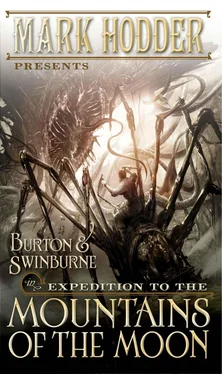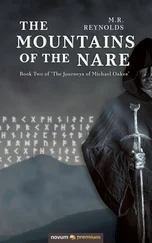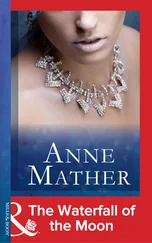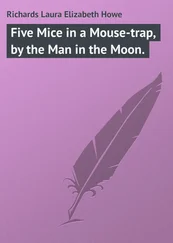Mark Hodder - Expedition to the Mountains of the Moon
Здесь есть возможность читать онлайн «Mark Hodder - Expedition to the Mountains of the Moon» весь текст электронной книги совершенно бесплатно (целиком полную версию без сокращений). В некоторых случаях можно слушать аудио, скачать через торрент в формате fb2 и присутствует краткое содержание. Жанр: sf_stimpank, на английском языке. Описание произведения, (предисловие) а так же отзывы посетителей доступны на портале библиотеки ЛибКат.
- Название:Expedition to the Mountains of the Moon
- Автор:
- Жанр:
- Год:неизвестен
- ISBN:нет данных
- Рейтинг книги:5 / 5. Голосов: 1
-
Избранное:Добавить в избранное
- Отзывы:
-
Ваша оценка:
- 100
- 1
- 2
- 3
- 4
- 5
Expedition to the Mountains of the Moon: краткое содержание, описание и аннотация
Предлагаем к чтению аннотацию, описание, краткое содержание или предисловие (зависит от того, что написал сам автор книги «Expedition to the Mountains of the Moon»). Если вы не нашли необходимую информацию о книге — напишите в комментариях, мы постараемся отыскать её.
Expedition to the Mountains of the Moon — читать онлайн бесплатно полную книгу (весь текст) целиком
Ниже представлен текст книги, разбитый по страницам. Система сохранения места последней прочитанной страницы, позволяет с удобством читать онлайн бесплатно книгу «Expedition to the Mountains of the Moon», без необходимости каждый раз заново искать на чём Вы остановились. Поставьте закладку, и сможете в любой момент перейти на страницу, на которой закончили чтение.
Интервал:
Закладка:
He laughed, and it hurt, and tears poured down his cheeks.
He cried, and thought he might die.
He was quiet, and suddenly hours had passed and a dense fog was rolling in with the night.
Muddled impressions untangled and emerged from behind a veil of shock. He tried to force them back but they kept coming. Around him, London vanished behind the murk. Inside him, the truth materialised with horrible clarity.
She had flinched to one side.
Just as he'd pulled the trigger, she'd moved.
The assassin's second bullet had clipped her ear.
Sir Richard Francis Burton's bullet had hit her in the head.
It was me. I did it.
He had killed Queen Victoria.
Here it begins .
Here it ends .
Not the source, but just another part of a circle.
He sat in Portman Square.
The thick fog embraced him.
It was silent.
It was mysterious.
It was timeless.
And, behind it, the world he had created was very, very real.
APPENDIX I
by Algernon Charles Swinburne,
from Poems and Ballads , 1866.
I.
Who hath known the ways of time
Or trodden behind his feet?
There is no such man among men.
For chance overcomes him, or crime
Changes; for all things sweet
In time wax bitter again.
Who shall give sorrow enough,
Or who the abundance of tears?
Mine eyes are heavy with love
And a sword gone thorough mine ears,
A sound like a sword and fire,
For pity, for great desire;
Who shall ensure me thereof,
Lest I die, being full of my fears?
Who hath known the ways and the wrath,
The sleepless spirit, the root
And blossom of evil will,
The divine device of a god?
Who shall behold it or hath?
The twice-tongued prophets are mute,
The many speakers are still;
No foot has travelled or trod,
No hand has meted, his path.
Man's fate is a blood-red fruit,
And the mighty gods have their fill
And relax not the rein, or the rod.
Ye were mighty in heart from of old,
Ye slew with the spear, and are slain.
Keen after heat is the cold,
Sore after summer is rain,
And melteth man to the bone.
As water he weareth away,
As a flower, as an hour in a day,
Fallen from laughter to moan.
But my spirit is shaken with fear
Lest an evil thing begin,
New-born, a spear for a spear,
And one for another sin.
Or ever our tears began,
It was known from of old and said;
One law for a living man,
And another law for the dead.
For these are fearful and sad,
Vain, and things without breath;
While he lives let a man be glad,
For none hath joy of his death.
II.
Who hath known the pain, the old pain of earth,
Or all the travail of the sea,
The many ways and waves, the birth
Fruitless, the labour nothing worth?
Who hath known, who knoweth, O gods? not we.
There is none shall say he hath seen,
There is none he hath known.
Though he saith, Lo, a lord have I been,
I have reaped and sown;
I have seen the desire of mine eyes,
The beginning of love,
The season of kisses and sighs
And the end thereof.
I have known the ways of the sea,
All the perilous ways,
Strange winds have spoken with me,
And the tongues of strange days.
I have hewn the pine for ships;
Where steeds run arow,
I have seen from their bridled lips
Foam blown as the snow.
With snapping of chariot-poles
And with straining of oars
I have grazed in the race the goals,
In the storm the shores;
As a greave is cleft with an arrow
At the joint of the knee,
I have cleft through the sea-straits narrow
To the heart of the sea.
When air was smitten in sunder
I have watched on high
The ways of the stars and the thunder
In the night of the sky;
Where the dark brings forth light as a flower,
As from lips that dissever;
One abideth the space of an hour,
One endureth for ever.
Lo, what hath he seen or known,
Of the way and the wave
Unbeholden, unsailed-on, unsown,
From the breast to the grave?
Or ever the stars were made, or skies,
Grief was born, and the kinless night,
Mother of gods without form or name.
And light is born out of heaven and dies,
And one day knows not another's light,
But night is one, and her shape the same.
But dumb the goddesses underground
Wait, and we hear not on earth if their feet
Rise, and the night wax loud with their wings;
Dumb, without word or shadow of sound;
And sift in scales and winnow as wheat
Men's souls, and sorrow of manifold things.
III.
Nor less of grief than ours
The gods wrought long ago
To bruise men one by one;
But with the incessant hours
Fresh grief and greener woe
Spring, as the sudden sun
Year after year makes flowers;
And these die down and grow,
And the next year lacks none.
As these men sleep, have slept
The old heroes in time fled,
No dream-divided sleep;
And holier eyes have wept
Than ours, when on her dead
Gods have seen Thetis weep,
With heavenly hair far-swept
Back, heavenly hands outspread
Round what she could not keep,
Could not one day withhold,
One night; and like as these
White ashes of no weight,
Held not his urn the cold
Ashes of Heracles?
For all things born one gate
Opens, no gate of gold;
Opens; and no man sees
Beyond the gods and fate.
APPENDIX II
SIR RICHARD FRANCIS BURTON (1821–1890)
The year 1863 started well for Burton-he was at last able to enjoy a honeymoon with Isabel, a full year after they were married. Unfortunately, he then had to return to his consulate duties on the disease-ridden West African island of Fernando Po. He made various forays onto the mainland but was not much impressed by the slavery-ravaged tribal kingdoms he found there.
In August of 1864, he returned to England. Fourteen months earlier, John Hanning Speke and James Grant had come back in triumph from their expedition to find the source of the Nile. Now Burton and his former partner engaged in an unpleasant duel, and much was done to besmirch Burton's reputation. The conflict reached its climax in September, when, the day before they were scheduled to confront each another at a debate in the city of Bath, Speke died. He had shot himself in the left side of his body while out hunting. There is no clear evidence whether this was suicide or a tragic accident. Biographers generally agree that, preoccupied with the forthcoming debate, Speke was uncharacteristically careless with his weapon and probably discharged it by accident while climbing over a wall.
Burton appears to have gone off the rails for a time after this incident. Given the consulship of Brazil, he went to South America and, unlike all his other excursions, did not keep a journal or account of his travels. Witnesses, such as Wilfred Scawen Blunt, recalled that he was drinking heavily for much of the time. While in Buenos Aires, Burton fell in with a rather unscrupulous character-a fat man named Arthur Orton, who was passing himself off as Sir Roger Tichborne.
“I ask myself ‘Why?’ and the only echo is ‘damned fool!..the Devil drives.’”
— From a letter to Richard Monckton Milnes, 31st May, 1863
“And still the Weaver plies his loom, whose warp and woof is wretched Man. Weaving th’ unpattern'd dark design, so dark we doubt it owns a plan.”
Читать дальшеИнтервал:
Закладка:
Похожие книги на «Expedition to the Mountains of the Moon»
Представляем Вашему вниманию похожие книги на «Expedition to the Mountains of the Moon» списком для выбора. Мы отобрали схожую по названию и смыслу литературу в надежде предоставить читателям больше вариантов отыскать новые, интересные, ещё непрочитанные произведения.
Обсуждение, отзывы о книге «Expedition to the Mountains of the Moon» и просто собственные мнения читателей. Оставьте ваши комментарии, напишите, что Вы думаете о произведении, его смысле или главных героях. Укажите что конкретно понравилось, а что нет, и почему Вы так считаете.












